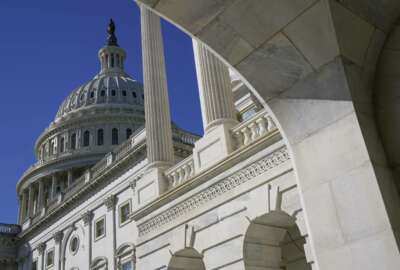
Senate Democrats unveil 2022 appropriations bills, back Biden’s planned federal pay raise
The nine appropriations bills that Senate Democrats unveiled Monday are silent on the topic of federal pay, meaning they'll defer to the president's recommendat...
With the clock ticking toward the next funding deadline in early December, Senate Democrats on Monday unveiled nine new appropriations bills for the remainder of 2022.
Together the nine bills, along with three others senators introduced earlier this year, would raise spending for civilian agencies by 13% in 2022. They also include a 5% boost for defense programs, higher than the Biden administration’s proposal, which suggested military spending stay relatively flat.
For federal employees, the draft bills from Senate Democrats are noticeably silent on a pay raise for civilian workers next year.
In their silence, Senate appropriators have essentially deferred to the plan President Joe Biden presented to Congress earlier this year. That plan called for a 2.2% across-the-board pay increase for federal employees, with an additional 0.5% in locality adjustments to total, on average, a 2.7% raise for 2022.
Neither the House nor Senate appears interested in legislating their own federal pay raise for civilian employees next year, making Biden’s planned 2.7% increase all the more likely.
Biden must make any adjustment official through an executive order, which typically comes near the end of the calendar year.
With Monday’s release, Senate Democrats have unveiled their proposals for all 12 appropriations bills that would fund federal agencies and programs for the rest of fiscal 2022.
But Congress isn’t nearly close to achieving that goal. While the House and Senate have each proposed how much they’d set aside for specific agency programs, Congress and the White House haven’t reached an agreement on how much they want to spend in the first place — and how much discretionary funding should go toward civilian and defense programs.
Senate Appropriations Committee Chairman Patrick Leahy (D-Vt.) said his panel released individual draft bills as a way, in part, to get those conversations moving.
“I have previously called for bipartisan, bicameral, negotiations on topline spending for fiscal year 2022, and I renew that call today so we can enact all 12 appropriations bills by Dec. 3, when the current continuing resolution expires,” he said Monday in a statement. “In the meantime, these bills demonstrate how we can make smart investments on behalf of the American people within the topline approved by Congress, and I hope will help advance the process.”
The panel’s top Republican, Sen Richard Shelby (R-Ala.), said the discussions so far have been one-sided. He said Republicans will oppose a variety of the provisions.
“We need a topline agreement that does not shortchange our nation’s defense and a willingness to set aside partisan politics,” Shelby said in a statement. “Only then will we be able to produce full year bills for the American people. Otherwise, we will oppose these partisan drafts. The clock is ticking.”
The House has also released draft versions for all 12 appropriations bills and passed nine of them. But House and Senate appropriators need an agreement on topline spending figures before they can begin to conference over the differences in their respective drafts — and then eventually pass final appropriations bills into law.
The current continuing resolution, which provided agencies with temporary funding when the fiscal year ended at the end of September, expires Dec. 3. Congress must complete this work by that date — or pass another short-term stop-gap funding bill to buy more time.
Civilian health, research agencies are big winners
The draft bills from Senate Democrats include many significant increases for a wide variety of civilian agencies and research initiatives.
The IRS, for example, would receive roughly $1.6 billion more over the previous year’s funding, consistent with what the Biden administration proposed earlier this year. The extra funding would address IRS customer service, IT modernization and enforcement needs, Senate appropriators said.
The Centers for Disease Control and Prevention would see a 24% increase to its budget in 2022, while both the National Institutes of Health and NASA would each receive a 6% funding boost.
The Senate proposal includes $2.4 billion in initial funding to set up a new research arm within the NIH, known as the Advanced Research Projects Agency for Health, or ARPA-H. The Senate bill proposes far less than what the president originally requested — and slightly less than what the House included in its own bill.
The organization that inspired that proposal, the Advanced Research Projects Agency-Energy (ARPA-E), would see a 17% increase in funding over current levels.
Notably, the Senate bill rescinds $1.9 billion in funding for border wall construction from previous years and repurposes those funds for border technology and other projects.
Customs and Border Protection and Immigration and Customs Enforcement would both see funding dip in 2022, while the Cybersecurity and Infrastructure Security Agency would receive $613 million more over current spending levels.
The Senate bill also dedicates $200 million to electrify the federal fleet, about $100 million less than the House proposal.
The draft bill allows the General Services Administration to spend roughly $11 billion through the Federal Buildings Fund, less than the president’s proposal but more than the House recommendation.
The Senate bill also includes $34 million more over 2021 levels for the Office of Personnel Management, and, like the House proposal, it allows the agency to create an IT working capital fund.
OPM is still recovering financially from the loss of its former security clearance business, and the National Academy of Public Administration recommended an IT working capital fund as a vehicle for the agency to make progress on a long list of modernization initiatives.
No TMF funding in Senate proposal
But unlike the House bill, the Senate’s proposal doesn’t include any funding for the Technology Modernization Fund.
Congress injected a $1 billion into the fund this spring through the American Rescue Plan Act, and the Biden administration awarded $311 million to four agencies last month.
The administration still has dozens of proposals under consideration for the remaining share. At a Bloomberg policy event Tuesday, federal Chief Information Officer Clare Martorana said the TMF board would announce more awards in the coming weeks.
Congressional willingness to spend on the TMF has been tepid since its creation. The House-passed bill set aside $50 million for the TMF in 2022, already far below the $500 million the White House requested for the fund.
Like the House bill, the Senate proposal removes a long-held prohibition on abortion services in the Federal Employees Health Benefits Program — a point of controversy for Republicans during the appropriations process.
Finally, the Senate proposal also includes new language urging GSA to finalize a plan for a new, consolidated FBI headquarters, preferably at one of the three previously-vetted sites in the national capital region.
The 2021 omnibus spending bill called for a report on the FBI headquarters, but Democrats on the Senate Appropriations Committee say that report is late. The Senate’s latest bill requires another update from GSA about its plans for a new FBI headquarters building.
Copyright © 2024 Federal News Network. All rights reserved. This website is not intended for users located within the European Economic Area.
Nicole Ogrysko is a reporter for Federal News Network focusing on the federal workforce and federal pay and benefits.
Follow @nogryskoWFED





